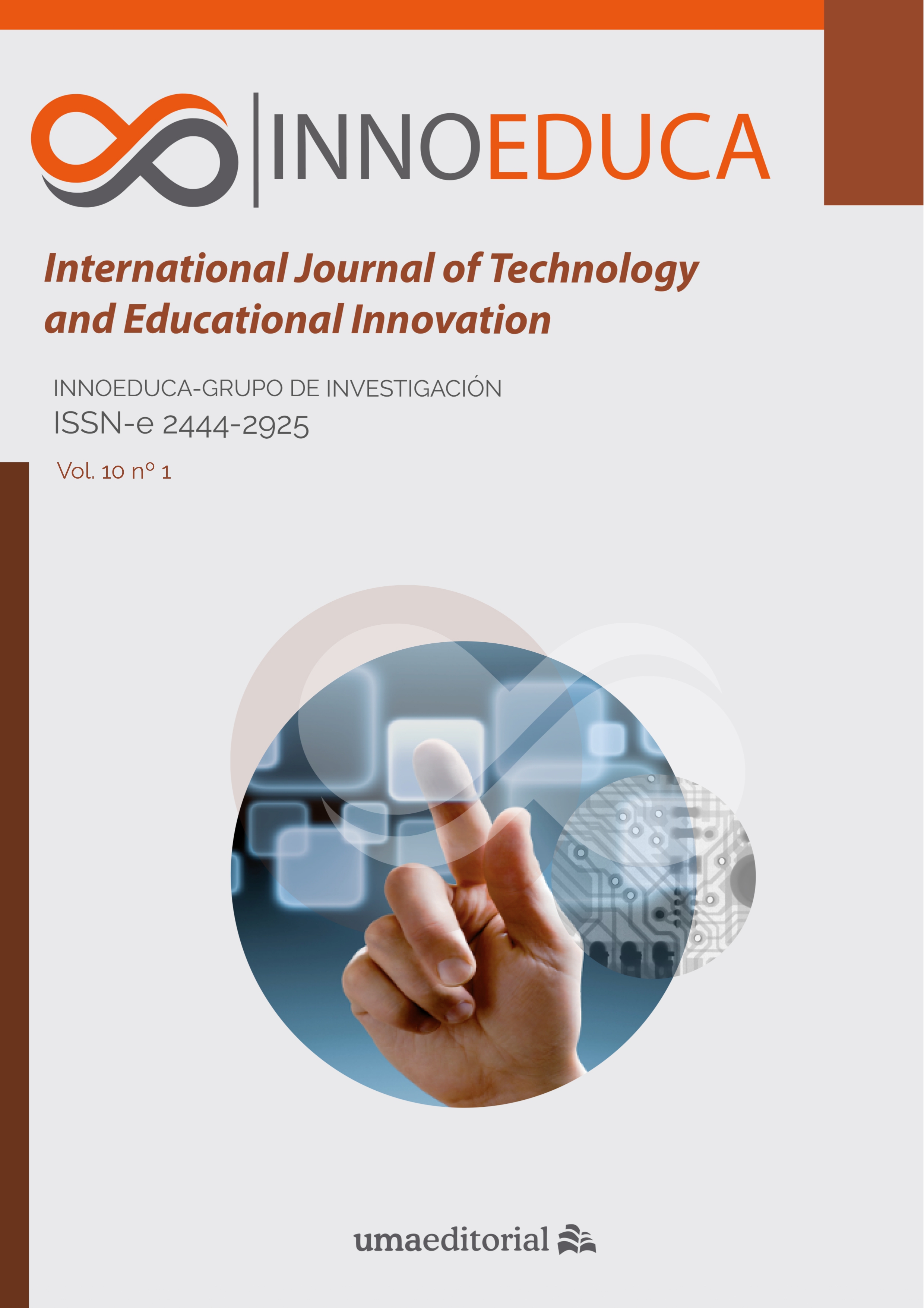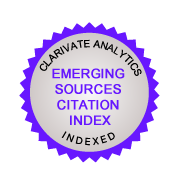The use of e-books to improve the academic performance of students in the subject of Physics: Implications for counselling
DOI:
https://doi.org/10.24310/ijtei.101.2024.15977Keywords:
Achievement, Physics, Grade three learners, ICT resourcesAbstract
The utilization of ICT resources has the potential to improve teaching and learning, according to the literature. To ascertain the possible influence of e-books on students' achievement in physics, no empirical research has been done in Nigeria. Hence the need for this study. Utilizing a simple repeated measures research design, this study was driven by a quantitative research methodology. The study included 58 senior secondary two (2) physics students who were randomly selected from secondary schools in the Nsukka Education zone. The Physics Achievement Test (PAT), which has been trial tested and face and content validated, was used to collect the data. The internal consistency dependability for the PAT components was .76. The repeated measures analysis of variance was used to analyze the data collected. It was discovered that the learners' access to e-books significantly impacted (p < .05) how well they performed in Physics. This research finding has implications for counselling in that teachers and their schools need to be provided educational guidance and couselling by the librarian-counsellor on the legal and ethical implications of using ICT resources like e-books to deliver physics instructions in schools.
Downloads
Metrics
References
Almekhlafi, A. G. (2021). The effect of E-books on Preservice student teachers’ achievement and perceptions in the United Arab Emirates. Education and Information Technologies, 26(1), 1001–1021. https://doi.org/10.1007/s10639-020-10298-x
Ardi, Z., Eseadi, C., Ade, A. H., Hidayat, H., & Guspriadi, Y. (2022). Students’ study pressures during the Covid-19 global pandemic: exploration of the effects of workload, self-expectation, grade worriness and despondency on college students in Indonesia. COUNS-EDU: The International Journal of Counseling and Education, 7(1), 32-47. https://doi.org/10.23916/0020220737710
Baskar A. (2017). E-resources and Its Uses in Library. Journal of Critical Reviews, 7(8), 3588–3592. https://doi.org/10.31838/jcr.07.08.569
Casselden, B., & Pears, R. (2020). Higher education student pathways to ebook usage and engagement, and understanding: highways and cul de sacs. Journal of Librarianship and Information Science, 52(2), 601-619. https://doi.org/10.1177/09610006198414
Chen, S., Jamiatul Husnaini, S., & Chen, J. J. (2020). Effects of games on students’ emotions of learning science and achievement in chemistry. International Journal of Science Education, 42(13), 2224–2245. https://doi.org/10.1080/09500693.2020.1817607
Cupido, A., & Suárez, B. (2022). Use of social networks by university students of the Faculty of Education (Universidad de Extremadura). Innoeduca. International Journal of Technology and Educational Innovation, 8 (2), 97-113. https://doi.org/10.24310/innoeduca.2022.v8i2.13719
Dudung, A., Hasanah, U., Salman, I., Priyanto, S & Ramdhan, T. (2022). Achievement of student graduates: The role of e-readiness, e-learning and e-book. International Journal of Data and Network Science, 6(2), 375-382. https://doi.org/10.5267/j.ijdns.2021.12.017
Dukper, K. B., Sakibu, B., & Arthur, B. (2019). Awareness and utilization of ICT resources by students of Tamale Technical University, Ghana. Library Philosophy and Practice(e-journal), 2078. http://digitalcommons.unl.edu/libphilprac/2078.
Eseadi, C. (2022). Effect of group mentoring on virtual library skills of secondary school students. Library Philosophy & Practice(e-journal), 6928. https://digitalcommons.unl.edu/libphilprac/6928
Eze, U. N., Sefotho, M. M., Onyishi, C. N., & Eseadi, C. (2021). Impact of COVID-19 Pandemic on Education in Nigeria: Implications for Policy and Practice of e-Learning. Library Philosophy and Practice(e-journal), 5651. https://digitalcommons.unl.edu/libphilprac/5651
Guillén, F.D., Colomo, E., Sánchez, E., & Pérez, R. (2020). Effects on the flipped classroom methodology through blackboard on the attitudes towards statistics of students of the primary education degree: A study with mixed ANOVA. Belo Horizonte, 13(3), 121-139. https://doi.org/10.35699/1983-3652.2020.25107
Green, S. G., Ferrante, C. J., & Heppard, K. A. (2016). Using open-book exams to enhance student learning, performance, and motivation. The Journal of Effective Teaching, 16(1), 19-35. https://files.eric.ed.gov/fulltext/EJ1092705.pdf
Jones, T., Prof, A., Brown, C., & Prof, A. (2011). Reading Engagement: a Comparison Between E-Books and Traditional Print Books in an Elementary Classroom. International Journal of Instruction, 4(2), 5-22. https://files.eric.ed.gov/fulltext/ED522678.pdf
Khoshimova, D. U. (2021). Improving speech skills using e-books. Интернет-пространство как вызов научному сообществу XXI века, (1), 133-137. https://cyberleninka.ru/article/n/improving-speech-skills-using-e-books/viewer
Korat, O., Levin, I., Atishkin, S., & Turgeman, M. (2014). E-book as facilitator of vocabulary acquisition: Support of adults, dynamic dictionary and static dictionary. Reading and Writing, 27(4), 613–629. https://doi.org/10.1007/s11145-013-9474-z
Korat, O., & Shamir, A. (2008). The educational electronic book as a tool for supporting children's emergent literacy in low versus middle SES groups. Computers & Education, 50(1), 110–124. https://doi.org/10.1016/j.compedu.2006.04.002
Kwangmuang, P., Jarutkamolpong, S., Sangboonraung, W., & Daungtod, S. (2021). The development of learning innovation to enhance higher order thinking skills for students in Thailand junior high schools. Heliyon, 7(6), e07309. https://doi.org/10.1016/j.heliyon.2021.e07309
Lakens, D. (2013). Calculating and reporting effect sizes to facilitate cumulative science: a practical primer for t-tests and ANOVAs. Frontiers in Psychology, 4, 863. https://doi.org/10.3389/fpsyg.2013.00863.
Lim, B. C. Y., Liu, L. W. L., & Choo, C. H. (2020). Investigating the Effects of Interactive E-Book towards Academic Achievement. Asian Journal of University Education, 16(3), 78–88. https://doi.org/10.24191/ajue.v16i3.10272
Marín-Díaz, V., Sampedro, B. E., & Vega Gea, E. (2022). Promoting learning through use of 360º videos. Innoeduca. International Journal of Technology and Educational Innovation, 8(2), 138-151. https://doi.org/10.24310/innoeduca.2022.v8i2.15120
Sari, S. Y., Rahim, F. R., Sundari, P. D., & Aulia, F. (2022, July). The importance of e-books in improving students’ skills in physics learning in the 21st century: a literature review. Journal of Physics: Conference Series, 2309, 012061. https://doi.org/10.1088/1742-6596/2309/1/012061
Shamir, A., Segal-Drori, O., & Goren, I. (2018). Educational electronic book activity supports language retention among children at risk for learning disabilities. Education and Information Technologies, 23(3), 1231–1252. https://doi.org/10.1007/s10639-017-9653-7
Shemy, N. S. (2020). The Impact of Digital Storytelling on Motivation and Achievement in Teaching Scientific Concepts for Pre-School Students. European Journal of Education Studies, 7(12), 801–820. https://doi.org/10.46827/ejes.v7i12.3627
Sun, L., & Pan, C.E. (2021). Effects of the Application of Information Technology to E-Book Learning on Learning Motivation and Effectiveness. Frontiers in Psychology, 12. https://doi.org/10.3389/fpsyg.2021.752303
Sung, Y.Y.C., & Chiu, D.K. (2022). E-book or print book: parents' current view in Hong Kong. Library Hi Tech, 40(5), 1289-1304. http://dx.doi.org/10.1108/LHT-09-2020-0230
Sung, H. Y., Hwang, G. J., Chen, C. Y., & Liu, W. X. (2022). A contextual learning model for developing interactive e-books to improve students’ performances of learning the Analects of Confucius. Interactive Learning Environments, 30(3), 470-483. http://dx.doi.org/10.1080/10494820.2019.1664595
Susilawati, E., Johari, A., Marzal, J., & Anggereini, E. (2022). Effects of Multimedia E-Books and Augmented Reality on Knowledge and Skills of Health Sciences Students: A Systematic Review. Journal of Client-Centered Nursing Care, 8(2), 99- https://doi.org/10. 10.32598/JCCNC.8.2.380.2
Ugwuanyi, C.S. (2022a). Evaluating the effectiveness of internet library resources on students’ achievement in Physics. Library Philosophy and Practice (e-journal), 6949. https://digitalcommons.unl.edu/libphilprac/6949
Ugwuanyi, C.S. (2022b). Enhancing children's achievement in basic science using library electronic books: a case of simple repeated evaluation. Library Philosophy and Practice (e-journal), 6573. https://digitalcommons.unl.edu/libphilprac/6573
Ugwuanyi, C. S., Ede, M. O., Onyishi, C. N., Ossai, O. V., Nwokenna, E. N., Obikwelu, L. C., Ikechukwu-Ilomuanya, A., Amoke, C. V., Okeke, A. O., Ene, C. U., Offordile, E. E., Ozoemena, L. C., & Nweke, M. L. (2020b). Effect of cognitive-behavioral therapy with music therapy in reducing physics test anxiety among students as measured by generalized test anxiety scale. Medicine, 99(17), e16406. https://doi.org/10.1097/MD.0000000000016406
Ugwuanyi, C. S., Okeke, C. I. O., & Agboeze, M. U. (2020). Management of Test Anxiety Among Pupils in Basic Science Using Music-Based Cognitive Behavior Therapy Intervention: Implication for Community Development. Journal of Rational - Emotive and Cognitive-Behavior Therapy, 39, 285-305. https://doi.org/10.1007/s10942-020-00371-2
Ugwuanyi, C. S., Okeke, C. I., & Okeke, C. C. (2021). Information and communication technology tool and children's achievement in Basic Science: Implication for Evaluation of Library and Information Resources. Library Philosophy and Practice(e-journal), 6097. https://digitalcommons.unl.edu/libphilprac/6097
Wijaya, T. T., Cao, Y., Weinhandl, R., & Tamur, M. (2022). A meta-analysis of the effects of e-books on students' mathematics achievement. Heliyon, 8(6), e09432. https://doi.org/10.1016/j.heliyon.2022.e09432
Wilujeng, I., & Lestari, D. P. (2022). Effect of interactive multimedia e-books on lower-secondary school students’ curiosity in a Science course. Education and Information Technologies, 27(7), 9619-9639. http://dx.doi.org/10.1007/s10639-022-11005-8
Zhao, J., Hwang, G. J., Chang, S. C., Yang, Q. F., & Nokkaew, A. (2021). Effects of gamified interactive e-books on students’ flipped learning performance, motivation, and meta-cognition tendency in a mathematics course. Educational Technology Research and Development, 69, 3255-3280. http://dx.doi.org/10.1007/s11423-021-10053-0
Published
How to Cite
Issue
Section
License
Copyright (c) 2024 Innoeduca. International Journal of Technology and Educational Innovation

This work is licensed under a Creative Commons Attribution-NonCommercial-NoDerivatives 4.0 International License.
All contents published by Innoeduca. International Journal of Technology and Educational Innovation are subject to Creative Commons Attribution-Nocomercial-NoDerivatives 4.0 International License, whose complete text can be consulted at https://creativecommons.org/licenses/by-nc-nd/4.0/legalcode. Thus, copying, distribution, public communication, derivative works and commercial use of content are permitted as of the aforementioned issue provided that the source and the author of the text are cited.
It is the responsibility of the authors to obtain the necessary permits for images that are subject to copyright.

This work is licensed under a Creative Commons Attribution-NonCommercial-NoDerivatives 4.0 International License.









1.jpg)


242.png)












